Asbestos accelerates disease onset in a genetic model of malignant pleural mesothelioma
- PMID: 37441092
- PMCID: PMC10333928
- DOI: 10.3389/ftox.2023.1200650
Asbestos accelerates disease onset in a genetic model of malignant pleural mesothelioma
Abstract
Hypothesis: Asbestos-driven inflammation contributes to malignant pleural mesothelioma beyond the acquisition of rate-limiting mutations. Methods: Genetically modified conditional allelic mice that were previously shown to develop mesothelioma in the absence of exposure to asbestos were induced with lentiviral vector expressing Cre recombinase with and without intrapleural injection of amosite asbestos and monitored until symptoms required euthanasia. Resulting tumours were examined histologically and by immunohistochemistry for expression of lineage markers and immune cell infiltration. Results: Injection of asbestos dramatically accelerated disease onset and end-stage tumour burden. Tumours developed in the presence of asbestos showed increased macrophage infiltration. Pharmacological suppression of macrophages in mice with established tumours failed to extend survival or to enhance response to chemotherapy. Conclusion: Asbestos-driven inflammation contributes to the severity of mesothelioma beyond the acquisition of rate-limiting mutations, however, targeted suppression of macrophages in established epithelioid mesothelioma showed no therapeutic benefit.
Keywords: GM mouse model; asbestos; cancer therapy; macrophages; mesothelioma.
Copyright © 2023 Farahmand, Gyuraszova, Rooney, Raffo-Iraolagoitia, Jayasekera, Hedley, Johnson, Chernova, Malviya, Hall, Monteverde, Blyth, Duffin, Carlin, Lewis, Le Quesne, MacFarlane and Murphy.
Conflict of interest statement
The authors declare that the research was conducted in the absence of any commercial or financial relationships that could be construed as a potential conflict of interest.
Figures
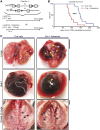
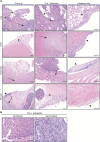
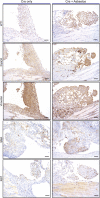
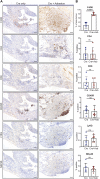
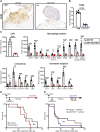
Similar articles
-
Use of preclinical models for malignant pleural mesothelioma.Thorax. 2021 Nov;76(11):1154-1162. doi: 10.1136/thoraxjnl-2020-216602. Epub 2021 Mar 10. Thorax. 2021. PMID: 33692175 Free PMC article. Review.
-
Modeling Malignant Mesothelioma in Genetically Engineered Mice.Curr Protoc. 2025 Jan;5(1):e70086. doi: 10.1002/cpz1.70086. Curr Protoc. 2025. PMID: 39791266
-
Whole exome sequencing of an asbestos-induced wild-type murine model of malignant mesothelioma.BMC Cancer. 2017 Jun 2;17(1):396. doi: 10.1186/s12885-017-3382-6. BMC Cancer. 2017. PMID: 28577549 Free PMC article.
-
Malignant vascular tumours of the pleura in "asbestos" workers and endothelial differentiation in malignant mesothelioma.Thorax. 2000 Oct;55(10):860-3. doi: 10.1136/thorax.55.10.860. Thorax. 2000. PMID: 10992539 Free PMC article.
-
The significance of BAP1 and MTAP/CDKN2A expression in well-differentiated papillary mesothelial tumour: a series of 21 cases and a review of the literature.Pathology. 2024 Aug;56(5):662-670. doi: 10.1016/j.pathol.2024.02.016. Epub 2024 May 9. Pathology. 2024. PMID: 38789301 Review.
Cited by
-
How to Better Understand the Influence of Host Genetics on Developing an Effective Immune Response to Thoracic Cancers.Front Oncol. 2021 Jun 21;11:679609. doi: 10.3389/fonc.2021.679609. eCollection 2021. Front Oncol. 2021. PMID: 34235080 Free PMC article. Review.
-
Contemporary management of mesothelioma.Breathe (Sheff). 2024 Jul 16;20(2):230175. doi: 10.1183/20734735.0175-2023. eCollection 2024 Jun. Breathe (Sheff). 2024. PMID: 39015660 Free PMC article. Review.
-
Use of preclinical models for malignant pleural mesothelioma.Thorax. 2021 Nov;76(11):1154-1162. doi: 10.1136/thoraxjnl-2020-216602. Epub 2021 Mar 10. Thorax. 2021. PMID: 33692175 Free PMC article. Review.
-
A Minimally Invasive Transthoracic Injection Technique for Reproducible Intrapleural Delivery in Mice.Methods Protoc. 2025 May 28;8(3):55. doi: 10.3390/mps8030055. Methods Protoc. 2025. PMID: 40559443 Free PMC article.
References
-
- Altomare D. A., Menges C. W., Xu J., Pei J., Zhang L., Tadevosyan A., et al. (2011). Losses of both products of the Cdkn2a/Arf locus contribute to asbestos-induced mesothelioma development and cooperate to accelerate tumorigenesis. PLoS One 6, 18828. 10.1371/journal.pone.0018828 - DOI - PMC - PubMed
-
- Andujar P., Lacourt A., Brochard P., Pairon J. C., Jaurand M. C., Jean D. (2016). Five years update on relationships between malignant pleural mesothelioma and exposure to asbestos and other elongated mineral particles. J. Toxicol. Environ. Health B Crit. Rev. 19, 151–172. 10.1080/10937404.2016.1193361 - DOI - PubMed
Grants and funding
LinkOut - more resources
Full Text Sources

